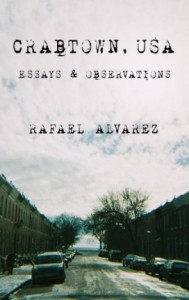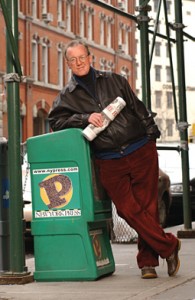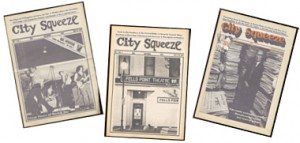 While reading Rafael Alvarez’s Crabtown, USA, I came across the chapter on his early days at City Squeeze, the self-published tabloid founded in 1977 by Johns Hopkins grads Russ Smith and Alan Hirsch, which became the City Paper in 1978. As Alvarez observed, the Smith-era City Paper “seemed like it existed solely to unnerve The Sun.” Smith and Hirsch sold the paper in 1987 to Scranton, PA-based Times-Shamrock Communications, but – irony of ironies – in 2014 the City Paper was purchased by none other than…the Baltimore Sun Media Group! (Smith went on to found the New York Press, which may have existed solely to unnerve the New York Times during Russ’ reign from 1988-2002.) I wrote for City Paper in the early ’80s and must confess that, though I disagreed with his politics, I liked Russ Smith. I mean, who else hires writers based on what drugs they did in college and whether they liked Dylan? (That was the gist of my interview, which was held at 2612 N. Charles Street – formerly the childhood home of my grandmother, Ruth Stone Warner! It later housed the offices of her brother William F. Stone’s architectural firm!) Anyway, as I was thinking back to those days, I came across this detailed profile of the enigmatic Smith. – Tom Warner
While reading Rafael Alvarez’s Crabtown, USA, I came across the chapter on his early days at City Squeeze, the self-published tabloid founded in 1977 by Johns Hopkins grads Russ Smith and Alan Hirsch, which became the City Paper in 1978. As Alvarez observed, the Smith-era City Paper “seemed like it existed solely to unnerve The Sun.” Smith and Hirsch sold the paper in 1987 to Scranton, PA-based Times-Shamrock Communications, but – irony of ironies – in 2014 the City Paper was purchased by none other than…the Baltimore Sun Media Group! (Smith went on to found the New York Press, which may have existed solely to unnerve the New York Times during Russ’ reign from 1988-2002.) I wrote for City Paper in the early ’80s and must confess that, though I disagreed with his politics, I liked Russ Smith. I mean, who else hires writers based on what drugs they did in college and whether they liked Dylan? (That was the gist of my interview, which was held at 2612 N. Charles Street – formerly the childhood home of my grandmother, Ruth Stone Warner! It later housed the offices of her brother William F. Stone’s architectural firm!) Anyway, as I was thinking back to those days, I came across this detailed profile of the enigmatic Smith. – Tom Warner
Alternatively Yours
by Dale Keiger (Johns Hopkins Magazine, February 2003)
The weekly New York Press is loud, vulgar, disrespectful, and unpredictable. That suits founder Russ Smith ’77 just fine.

Bruce Springsteen once penned a lyric about “a rich man singin’ in a poor man’s shirt.” Now consider Russ Smith ’77. He’s rich enough to afford a penthouse in Tribeca, keep two kids in private school, and complain about estate taxes. He makes the occasional guest appearance in the pinstripe-and-white-shirt pages of The Wall Street Journal, but for more than 14 years he has written for a journalistic poor man’s shirt, a free newspaper called New York Press.
The Press, which Smith founded in 1988, is a gadfly: loud, vulgar, self-indulgent, disrespectful, and bracing. It has been on the wrong side of journalism’s tracks for all of its existence. It raises too much hell, publishes too much crude language, and carries too many explicit sex ads to be mainstream. Yet it prints too much right-wing commentary — much of it written by Smith — to be a member of the alternative orthodoxy. If The Village Voice is Joan Baez — earnest, iconic, and getting long in the tooth — the Press is the Sex Pistols, loud, crude, and sneering at how predictable and respectable the alternative press, including the Voice, has become.
Every Tuesday morning, 116,000 copies of the Press appear in news boxes on the street corners of Manhattan. A typical issue has about 120 pages, two-thirds of them devoted to listings and advertisements for clubs, restaurants, galleries, theaters, real estate, and the goods and services provided by people who call themselves Mistress Monique and Electra, the “wicked wonder.” Editorial content might include a personal essay by a college senior one month from graduation, an article about New York lounge singers, an interview with Motown’s Funk Brothers, and comics by Lynda Barry and Tony Millionaire. Plus a weekly feature called “Mugger.”

Continue reading “Alternatively Yours” at Johns Hopkins Magazine.
